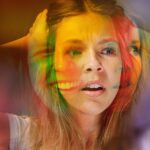13-Year-Old Girl Gets Maximum Score on IQ Test With No Time to Prepare

What would you do if you were handed one of the world’s toughest intelligence tests—with no time to prepare? Most of us would panic, second-guess ourselves, or at least ask for a quick study guide. But for one 13-year-old girl in the UK, the challenge turned into an opportunity to do the unthinkable—and succeed beyond expectations.
What followed wasn’t just a high score—it was a headline-making moment that stunned even those closest to her. But this isn’t your typical story of academic overachievement. It’s about a teenager who blends sharp intellect with surprising balance, quiet confidence, and a life full of unexpected passions.
So how did she do it—and what makes her story stand out in a world filled with test scores and talent shows? Let’s take a closer look.
Meet Sofia Kot Arcuri

Sofia Kot Arcuri isn’t just the girl with a sky-high IQ—she’s also the girl who dances en pointe, codes for fun, and casually tosses out trivia that leaves adults stumped. At 13, Sofia is already breaking stereotypes about what it means to be “gifted.” While she’s academically brilliant, her life is far from confined to books and test papers.
Teachers noticed her potential early on. In primary school, Sofia consistently ranked at the top of her class, breezing through subjects with ease. By the time she took her 11-plus exams, she earned a spot in a prestigious grammar school without breaking a sweat. But ask anyone who knows her, and they’ll tell you she’s more than her grades. She’s described as bubbly, friendly, and deeply curious—a teenager who fits in perfectly at school while also standing out in the best possible way.
When she’s not solving logic problems or dazzling in computer science class, you’ll likely find her in a dance studio. A committed ballet student, Sofia also performs in musical theatre and plays the piano, proving that creativity and logic can coexist beautifully. It’s this rare mix of intellectual depth and artistic expression that makes her story especially compelling—not just because of what she’s accomplished, but because of who she is while doing it.
How She Aced the Impossible—Without Studying

Taking a Mensa IQ test is no small feat. It’s designed to push the boundaries of logical reasoning, pattern recognition, and problem-solving—usually under tight time limits. Most candidates prepare for weeks, familiarizing themselves with tricky formats and timed challenges. Sofia? She walked in cold.
With a packed school schedule and no time for practice runs, Sofia sat for the test in January with no special preparation. She hadn’t tried any Mensa-style questions beforehand, nor did she cram or drill through practice books. What she brought instead was her natural ability—sharp thinking, calm focus, and a genuine curiosity about how things work.
And yet, she didn’t just do well—she scored the highest possible mark for someone her age: a staggering 162. For context, that places her above the estimated IQs of Einstein and Hawking, both often benchmarked around 160. Sofia’s raw, instinctive performance didn’t just challenge norms; it redefined what natural intelligence can look like when it’s truly unfiltered. The fact that she excelled under unfamiliar conditions only underscores her remarkable mental agility—something no amount of test prep can teach.
The Moment of Truth
When Sofia’s test results arrived in the mail on March 14, the anticipation was almost too much to handle. Her mother, Cecylia, stood by the door, phone in hand, ready to capture whatever reaction might unfold. What came next was pure, unscripted joy.
As Sofia opened the envelope and read the score—162—her face lit up with disbelief and excitement. It wasn’t just a win; it was a moment of validation that neither she nor her family had seen coming. Her mom, proud and visibly emotional, described the experience as unforgettable. “She was absolutely thrilled,” Cecylia later said. “The joy on her face was priceless.”
What made it even more special was how genuine it all felt. There were no victory dances or over-the-top reactions—just a quiet, beaming smile and a sense of wonder. For Sofia, it wasn’t about beating a record or outshining anyone. It was about challenging herself and discovering just how far her mind could take her, even without a game plan. And that moment—simple, raw, and deeply human—said more than the number on the page ever could.
Coder by Day, Ballerina by Night

For someone who just earned a place among the top two percent of minds in the world, Sofia’s ambitions are refreshingly grounded—and undeniably cool. At school, her favorite subject is computer science, and she’s already making waves in it. According to her mother, Sofia once fixed a classroom bug that even stumped her teacher. For many kids, that would be a bragging right for months. For Sofia, it was just another Tuesday.
Her love for coding isn’t just academic—it’s aspirational. She’s already set her sights on a future in tech, with dreams of turning her problem-solving skills into tools that help people. Whether it’s building programs, debugging systems, or learning new languages (computer ones, that is), Sofia thrives on the logic and creativity that come with writing code.
But she’s not all algorithms and keyboards. When she’s not cracking logic puzzles, she’s likely rehearsing for a ballet recital or practicing piano. A dedicated dancer, Sofia performs with her local ballet school and also immerses herself in the world of musical theatre. The grace and discipline of the arts seem to complement her analytical mind, creating a rare harmony of logic and lyricism. It’s this dynamic blend—equal parts coder and creative—that makes her story feel less like a résumé and more like a well-rounded symphony.
Where Her Brilliance Really Came From

Sofia’s brilliance didn’t come out of nowhere—it runs deep in her family roots. Her mother, Cecylia, works in finance, a field that requires more than a passing familiarity with numbers. But it’s her grandfather, Antoni Kot, whose legacy may have played the biggest role in shaping Sofia’s natural gifts.
Antoni wasn’t just a mathematician—he was a headteacher and a lifelong educator, revered in his community in Poland. Even into his eighties, he continued to tutor students, his mind sharp until the very end. He passed away in 2023 at the age of 86, but his passion for numbers and problem-solving clearly lives on through his granddaughter. “His love for maths never faded,” Cecylia recalled. “We believe Sofia inherited her talent and passion from him.”
It’s a rare kind of inheritance—one that can’t be touched or measured, but shows up in the way a child tackles a tricky equation or sees the world through patterns and logic. For Sofia, this connection is more than genetic; it’s a quiet tribute to a grandfather she admired, whose influence still shapes the way she learns, dreams, and creates.
5 Ways to Foster Lifelong Brilliance
Every child has immense potential, but unlocking it requires the right environment and approach. Here are a few key tips to help support their growth without pressure or burnout:
1. Create a Stimulating Environment
Fill your home with books, puzzles, and tools that spark curiosity. Exposure to diverse subjects—like art, science, and music—allows your child to explore their interests and build confidence.
2. Balance Structure with Freedom
While routines help, high-achieving kids also need time to explore projects beyond schoolwork—whether it’s coding, composing, or simply daydreaming. This balance nurtures creativity and passion.
3. Encourage Curiosity and Questions
Celebrate your child’s curiosity by encouraging them to ask “why” and challenge ideas. Intelligence is about critical thinking and understanding, not just having the right answers.
4. Support Emotional and Social Growth
Help your child develop emotional maturity and resilience. Empathy, healthy friendships, and social skills are essential tools for navigating the world and contributing beyond academic achievement.
5. Celebrate Effort, Not Just Results
Praise the process, not just the outcome. Recognize their effort in problem-solving, perseverance, and creativity. Acknowledging the journey helps cultivate a growth mindset and encourages long-term success.
By fostering a well-rounded environment, you can help your child develop their full potential—beyond grades or test scores. Encourage exploration, curiosity, and emotional growth to support them in becoming confident, balanced individuals.
Genes, Grit, or Genius?

Sofia Kot Arcuri’s story is a powerful reminder that intelligence cannot be defined by one test score or one moment of achievement. It challenges us to rethink how we measure success and, more importantly, how we nurture the potential in young minds. Sofia didn’t just prove that she could excel without preparation—she showed us that intelligence is multifaceted. It’s not only about how well you do on a test, but about how you balance intellect with creativity, logic with passion, and problem-solving with curiosity.
For parents and educators, Sofia’s journey offers valuable lessons in how to support children as they grow. It’s not about pushing them to conform to one narrow idea of success, but about fostering an environment where curiosity thrives, where failure is seen as a lesson, and where creativity is just as important as academic achievement.
So, as we look at Sofia’s remarkable accomplishment, let’s ask ourselves: Are we giving our children the space to discover their own path, free from the pressure of perfection? True success comes not from scoring high or outperforming others—it comes from staying true to who we are and how we think. Sofia has done just that, and her story is a testament to the limitless potential that exists within each of us when we embrace learning, exploration, and balance.
Featured Image Source: Shutterstock
Loading...






